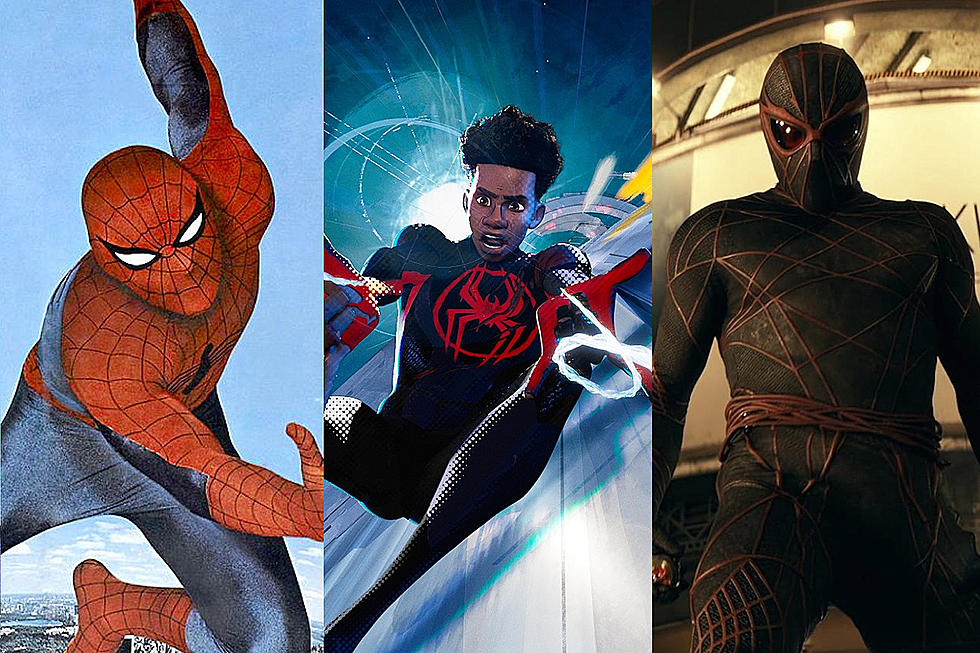![Amazing Spider-Man #639: Remember When That Thing You Remember Didn’t Happen? [Review]](http://townsquare.media/site/622/files/2010/08/no-mj.jpg?w=980&q=75)
Amazing Spider-Man #639: Remember When That Thing You Remember Didn’t Happen? [Review]

I was under the impression that we -- and in the subset of "we" I'm including the people who read comics and the people who make comics --had all quietly come to an understanding. I had thought we'd all agreed to appreciate the current run of "Amazing Spider-Man" and the often enjoyable stories produced by the creative teams that have worked on the book since it went monthly with the events of "Brand New Day" while not speaking or thinking about the awkward meddling from on high that set the rules of the current status quo in place.
Unfortunately, at least one of us has decided not to stick to that implicit agreement, however: Joe Quesada, Editor-in-Chief and chief awkward meddler during the conclusion of "One More Day," has been possessed by a mad scientist-like conviction that he can show the world how he was right all along on the matter of Peter Parker's marriage and cause us to rue the day we ever questioned him. So he's taken over writing duties for "One Moment in Time," the current story arc, which finally explains the altered events in Peter Parker and Mary Jane's history that were rewritten by a knockoff Satan and lead to them never being married.It also recounts how, an indefinite amount of comic book time later, Peter's Aunt May miraculously recovered from a gunshot that should have killed her thanks to Spider-CPR.
The old fable of chaos theory tells how, for want of a nail, a kingdom can be lost. In this case, though, for want of not getting punched hard in the face, a marriage is lost. When Peter's Spider-Man duties cause him to miss his wedding as a result of fist-related unconsciousness it turns out to be the final straw for Mary Jane. She comes to the realization that while she can deal with the risks of sharing a life with the superhero and the constant worries of what could happen to him, she could never come to terms with bringing a child into the world and asking it to deal with those same problems.
And Mary Jane wants kids, so Ms. "Early Stages of Baby Crazy" is quick to assure Peter that no kids means no marriage. Of course there's a heartwarming scene where they proclaim they still love one another and vow never to be apart, with the implicit understanding that they can never be married, never have children and that Mary Jane will want to find someone to someday have kids with. Ah, true love.

To Quesada's credit he does an all right job of breathing life into his interpretations of the characters. The scenes between Peter and MJ feel authentic, and it's heartbreaking as we see them each struggle with the fact that they can't satisfy both their own desires in life and those of their loved one. Quesada does have a firm grasp on the justifications he gives Mary Jane and they come across as believable and understandable concerns that someone could have, and at the same time he does a good job of selling Peter's obvious struggle, as a part of him wants to give up his life of crime-fighting for her even though he knows he'll never bring himself to make that decision. That being said, I still have a problem with the book. And that is a fundamental disagreement with Quesada's opinion that Peter is a better character to tell stories about when he's young, care-free and single.
Quesada's motivated out of nostalgia; the Peter Parker he remembers as a young comic reader wasn't married and didn't have to worry about some day starting a family, so that's the Peter Parker he wants to hear stories about. And while single tends to be the norm for superheroes, and not having children tends to be even more common, those aren't elements that automatically get in the way of good storytelling. They can, when used correctly, enhance it.
See, for example, the work Jonathan Hickman's been doing lately with the Richards family in his "Fantastic Four" run. Or the work Brian Michael Bendis has done with the characters of Jessica Jones and Luke Cage. My disagreement with Quesada lies in the fact that one of the more interesting parts of Peter Parker's story is his constant juggling of his life as a costumed fighter with his desire to be an ordinary, happy guy. It was never easy for Pete, but that's what made even the small victories and the little moments of happiness all the more satisfying.

There are a great many examples along the spectrum of superheroes sacrificing their personal lives in order to follow a calling of using their abilities to make the world a better, safer place. On one extreme you've got someone like Batman, who has given up almost any attempt at having a life as Bruce Wayne, instead turning that personality into a shell to support his never-ending battle against crime. And at the other end you've got Superman, who is always going to be home in time for dinner with Lois, save for the rare occasions when he's off in another part of the galaxy. And who, thanks to super speed, strength and invulnerability is always going to be there to save loved ones in danger just in the nick of time.
Spider-Man operates in a sweet spot somewhere in the middle of that spectrum, able to fight crime and still have a life but always in the most precarious way. And always faced by the temptation that he could do one so easily if he simply chose to give the other up. That conflict's good for the story, and the increasing intensity of his relationship with Mary Jane over the years only upped the stakes of Peter maintaining a healthy personal life. When that got thrown away, to me it was a regression to a point in time that's less interesting for Pete. Because a Spider-Man story isn't just about whether or not he can beat the bad guy, it's also about whether or not he can do it without ruining his regular life in the process. When that regular life doesn't have as much going for it as it once did, I don't care quite as much as I used to.
More From ComicsAlliance








![Everything We Can’t Wait To See At San Diego Comic Con, Part Two: Saturday & Sunday [SDCC 2016]](http://townsquare.media/site/622/files/2016/07/SDCC-Sat1.jpg?w=980&q=75)
